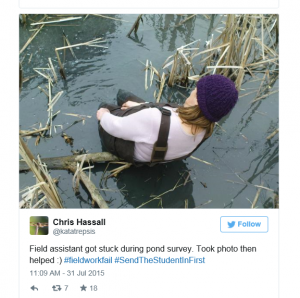A new report highlighted yesterday by Jack Grove in the Times Higher indicates that ‘the UK’s female academics are paid £6,146 less on average than men, with lack of women in leadership and management roles a factor.’
Tag Archives: Times Higher
You do not need to work 80 hours a week to succeed in academia
Published today in the Times Higher, Meghan Duffy (Associate Professor at the Duffy Lab University of Michigan) argues how you can get on in academia without being chained to your desk:
‘There is a persistent myth (some might even call it a zombie idea) that getting tenure in academia requires working 80 hours a week. There’s even a joke along the lines of “The great thing about academia is the flexibility. You can work whatever 80 hours a week you want!”
The idea that you need to work 80 hours a week in order to publish or get grants or tenure is simply wrong. Moreover, I think it’s damaging. I hear routinely from younger folk (often women) who are seriously considering leaving academia primarily because they think that a tenure track position would require working so much that they wouldn’t be able to have any life outside work (including raising a family). So, this is my attempt at slaying the zombie idea that succeeding in academia requires working as much as an investment banker…………’
How many hours a week to you work? Have you ever added up the time you actually spend working? Do we have a competitive atmosphere in terms of the number of hours people work?
Make science courses more accessible to stop women dropping out, says author
Published in the Times higher on 11th October – ‘Stereotypes, prejudice and laddish behaviour still deter young women interested in physics, engineering and computer science, says Eileen Pollack (Professor of creative writing at the University of Michigan and author of The Only Woman in the Room: Why Science Is Still a Boys’ Club). Eileen argues that ‘science courses designed “to weed out those who don’t come as prepared as they should be” need to be radically reformed so that more under-represented groups including women do not drop out of such programmes’
Eileen ‘was discouraged by stereotyping and other obstacles from pursuing a PhD, and notes that even today women still make up only a fifth of the physics PhD students in the US. It was this that spurred her to write a book about “what it felt like to be an intelligent, ambitious young woman growing up in the late sixties and early seventies, and why even today so few women and minorities go on in science”.
Social scientists asked to comment on early career support
Published in the Times Higher on the 11th October, Jack Grove highlights a survey being undertaken by the new Centre for Global Higher Education at UCL. Early career social scientists are being invited to comment on the support they have received since completing their doctorate in order to improve support for those people just starting out in academia. ‘Any social scientists who were awarded their doctorate within the past eight years are asked to complete the survey at ioe.onlinesurveys.ac.uk/esrc-survey‘
UUK president Julia Goodfellow aims to ‘keep sector together’
Dame Julia Goodfellow (Vice-Chancellor of the University of Kent) has been appointed the new President of Universities UK. An interview with Julia was published on the 8th September in the Times Higher.
Since UUK was established in 1918, under its former name of the Committee of Vice-Chancellors and Principals of the Universities of the United Kingdom, it had only ever had male presidents until Dame Julia took up her post. Expanding on the question of why it took so long for a woman to become president, Dame Julia noted that there are “relatively few female vice-chancellors” and that just a fifth of UK professors are women. “It takes time for that leaky pipeline to come through. But it’s only been 100 years,” she joked. She continued: “I just think it’s sad that in the 21st century we’re still talking about being the first woman to do a job.” Dame Julia added that “making sure that women can progress through university life and through their career structure is obviously important to me personally – it is at Kent – and I think it is for universities generally”.
Follow this link to read the full article – UUK President
10 habits for a successful postdoc
Published in the Times Higher on 9th September, Catherine L Drennan (Professor of Chemistry and Biology at the Massachusetts Institute of Technology) discusses the 10 must-dos for a successful postdoc.
Tip number 1:
‘Take ownership of your project – Your project is your baby. There will be loss of sleep, and growing pains, but you will have a special bond. You should know more about your project than anyone else. Get the help you need. Take full advantage of group meetings, faculty, others in the lab. Being a postdoc doesn’t mean that you should know everything.’
Follow the link to read more – Top 10 must-dos
Do you have any more top tips?
#FieldworkFail: Twitter users share their research mishaps
Across the world research staff and students are continuing to take to Twitter to share their #Fieldworkfails. Chris Parr has published an article about some of the funniest stories in the Times Higher.
I can relate to the story below – I have been on fieldwork when I had to stop laughing before I could help someone stuck knee deep in mud!
Athena SWAN reaches Ireland
Published in the Times Higher on 30th July, Holly Else reports that ‘the Equity Challenge Unit has awarded Trinity College Dublin and the University of Limerick bronze institutional awards for their work on promoting women’s careers in science subjects. Irish universities made ten applications, including those of the two successful institutions, to the scheme, which was launched in Ireland as a pilot project earlier this year. Trinity College Dublin also achieved bronze departmental awards for its schools of chemistry, physics and natural sciences.’
Follow this link to read more – Athena SWAN reaches Ireland
Is flexible working holding back women’s careers?
Published today (23rd July) in the Times Higher, Jack Grove examines whether flexible working is holding back women’s careers.
‘Letting people work hours that help them juggle childcare and professional commitments would seem like an unqualified good for university staff. But flexible working can also be a “double-edged sword”, with adverse consequences on women’s long-term career prospects, a major new study has warned. In a report published last week, the New Joint Negotiating Committee for Higher Education Staff’s working group on gender pay says there is a “misperception of the value of flexible workers” at some institutions that meant that “some individuals…could be seen as less promotable because they work flexibly”. That harmful view is more likely to affect women than men, says the group, which included representatives from universities, trade unions and the Equality Challenge Unit…………….’
Follow this link to read more – Times Higher
Would you consider flexible working? Does this work for you?
The postdoc experience: hopes and fears
What is it actually like to be a postdoc? Do the pressures to publish, secure funding and network keep you awake at night? Or do you relish the challenge?
Holly Else from ‘Times Higher Education spoke to six postdocs who work in a range of disciplines at UK universities about their hopes and fears, and the reality of life in the choppy waters of the academy immediately after completing a PhD.’
Filippo Contesi – ‘Some people have a plan B. I don’t. I am not going to make a plan B until I feel myself not getting what I want’
Elena Riva – ‘The baby changed my life quite a lot…I loved research but when you find something that makes you happy, you follow it’
Ozlem Edizel – ‘Sometimes all the deadlines from both universities come at the same time’
Bert van Landeghem – ‘I have moved around a lot already. It is nice to move around but you cannot keep on doing it for ever’
David Loudon – ‘You can’t keep carrying on being a postdoc without trying to progress in some way’
Adina Feldman – ‘I know that there are problems with academia but there are also good things. I like the flexible work environment’
You can read the full interviews here – https://www.timeshighereducation.co.uk/the-postdoc-experience-hopes-and-fears?nopaging=1
What are your experiences? What advice would you offer someone completing their PhD and considering a postdoc?











